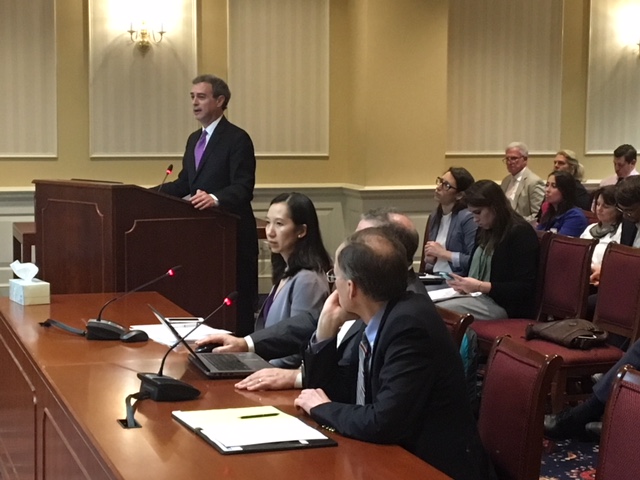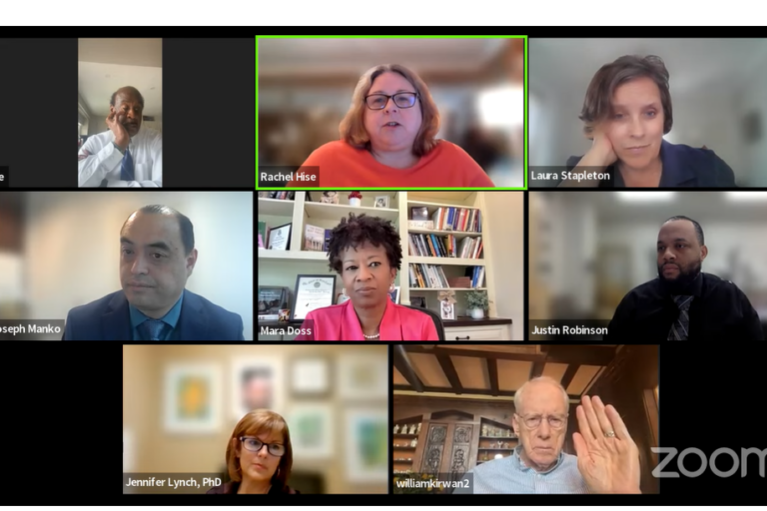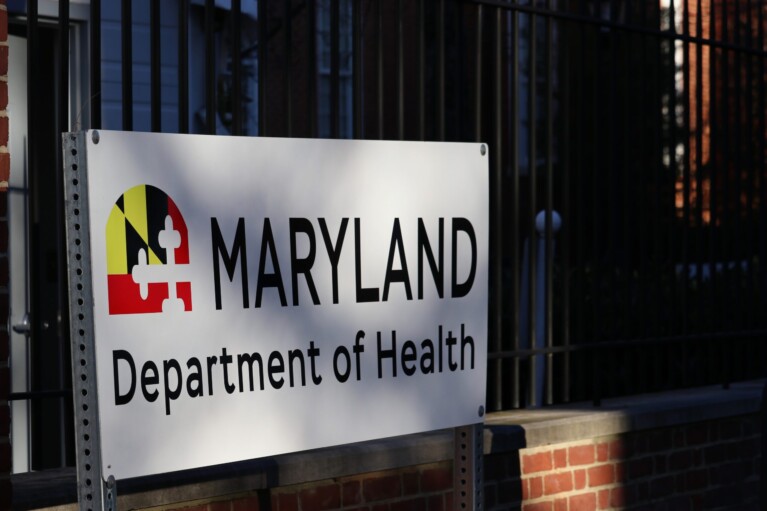Faced With Potential Insurance Crisis, Maryland Weighs New Coverage Mandate
Maryland’s individual health insurance market is in danger of collapse if government and industry don’t find ways to persuade younger, healthier people to purchase coverage, a legislative panel was told Wednesday.
The culprit, according to industry leaders, is the decision late last year by Congress and President Trump to repeal the individual mandate portion of the Affordable Care Act.

Sen. Brian J. Feldman testifies on behalf of his bill, Protect Maryland Health Care Act. Seated at the table are Baltimore city Health Commissioner Lena Wen, Vincent DeMarco and professor Rob Sprinkle of University of Maryland School of Public Policy. Photo by Bruce DePuyt
“What we have seen is a shrinking of the enrollment, particularly off [Maryland’s health insurance] exchange,” Chet Burrell, CEO of CareFirst BlueCross, told the Senate Finance committee. “The reason for this, we think, is that premiums have reached a level that few can afford. And if you’re off the exchange, you’re paying the entire premium yourself.”
Burrell, who testified alongside a top official from Kaiser Permanente, the other firm offering coverage in the individual market in Maryland, expressed concern about “the viability of this market going forward.”
Sen. Brian J. Feldman (D-Montgomery), who has co-sponsored legislation to address the problem, told reporters, “We’re now seeing young, healthy people pull out of the insurance pool, which causes everybody else’s premiums to go up. We’ve got to find a way to get those folks back into the individual insurance market [and] stabilize the insurance market.”
Feldman and Del. Joseline Pena-Melnyk (D-Prince George’s, Anne Arundel) have drafted legislation that would reimpose, at the state level, the penalty that individuals without insurance paid under Obamacare. But rather than collect that money, the state would combine it with federal tax credits to purchase coverage for the individual.
In essence, advocates of the Protect Maryland Health Care Act say, the penalty becomes a “down payment” on an insurance plan. “It’s a way to keep people enrolled and insured,” Pena-Melnyk said.
Stan Dorn, a policy expert at FamiliesUSA, a group that lobbied on behalf of the Affordable Care Act and a Maryland resident, helped devise the proposal. He told lawmakers that most individuals without insurance — given a choice between paying a $700 penalty or converting that penalty into a “pre-payment” — would choose the latter.
A person seeking family coverage would potentially pay an additional $25 a month in premiums, Dorn said. He told the Senate Finance Committee that U.S. Census data suggests there are 60,000 Maryland residents, most younger than 35, who would qualify for individual coverage without additional monthly cost.
“By doing everything we can to make it a no-brainer for people to get coverage, we’re going to get some significant improvements in the risk pool — without spending state money, without getting a federal waiver, and without imposing taxes on the citizens of Maryland,” Dorn said.
Not calling the penalty a tax could be key to getting a buy-in from Gov. Lawrence J. Hogan (R), whose support is considered critical. Hogan, who won in 2014 by criticizing former Gov. Martin O’Malley (D) for repeatedly raising taxes, met with legislative leaders to discuss the looming health insurance crisis this week.
While he has urged lawmakers to address the problem, he has not championed a particular bill. His deputy legislative officer, Matt Palmer, read excerpts from the governor’s public comments during a brief appearance at the hearing, but he offered no new insight into the governor’s position.
“The politics of a tax versus a fee is very much on the table,” said panel Chairman Thomas M. “Mac” Middleton (D-Charles), part of the group that met with Hogan. Middleton is backing a measure he describes as a “Band-Aid.” It would provide $350 million “to stabilize the individual market” this year, while work continues on a longer-term solution.
Funding for the short-term fix could come from a windfall the state is expecting in corporate income tax receipts this year.
Shareese DeLeaver-Churchill, a Hogan spokeswoman, said in a statement that the governor’s meetings with lawmakers “have been very productive, and they will continue going forward as we work to address this important issue.”
Burrell, the CareFirst executive, told the committee that people with stable health comprise about 75 percent of the market in Maryland. The remaining 25 percent, “those that are sick, to varying degrees” represents a 100-to-1 difference in medical costs.
“This is a classic death spiral in a market, where the healthy leave first and the sick remain because they need the coverage. And in the end premiums rise steeply and can’t ultimately catch up to what the cost is,” Burrell said.
Maryland’s insurance Commissioner Alfred W. Redmer Jr. agreed, telling the panel, “The market will implode if we don’t act and act soon.”
Marta Harting, an attorney representing Kaiser, expressed concern about the administrative costs of the bill. In addition, she told the committee, “It sends a message that you don’t need to sign up for insurance. That’s not the message we want to send.”
The legislature is looking at a raft of health insurance bills this session. One, modeled after laws passed in New York and Minnesota, would provide coverage for individuals making up to 200 percent of poverty through state contracting plans, largely paid by the federal government.
“In the two years since they implemented it, enrollment more than doubled,” Dorn said. “Hundreds of thousands of uninsured people signed up for coverage, disproportionately young adults.”
Another measure, backed by Sen. Paul G. Pinsky and Del. Erek Barron, Democrats from Prince George’s, would have Maryland adopt a single-payer model. That measure is up for a hearing next month.




 Creative Commons Attribution
Creative Commons Attribution